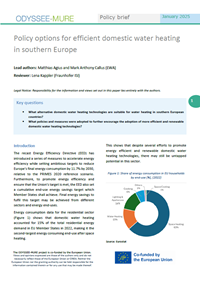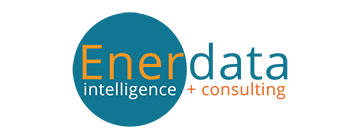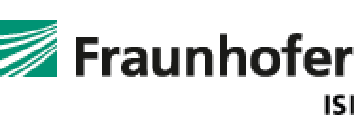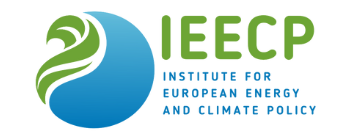Summary
Key questions
- What alternative domestic water heating technologies are suitable for water heating in southern European countries?
- What policies and measures were adopted to further encourage the adoption of more efficient and renewable domestic water heating technologies?
Lead authors: Matthias Agius and Mark Anthony Callus (EWA)
Reviewers: Lena Kappler (Fraunhofer ISI)
Introduction
The recast Energy Efficiency Directive (EED) has introduced a series of measures to accelerate energy efficiency while setting ambitious targets to reduce Europe’s final energy consumption by 11.7% by 2030, relative to the PRIMES 2020 reference scenario. Furthermore, to promote energy efficiency and ensure that the Union’s target is met, the EED also set a cumulative end-use energy savings target which Member States shall achieve. Final energy savings to fulfil this target may be achieved from different sectors and energy end-uses.
Energy consumption data for the residential sector (Figure 1) shows that domestic water heating accounted for 15% of the total residential energy demand in EU Member States in 2022, making it the second-largest energy consuming end-use after space heating.
This shows that despite several efforts to promote energy efficient and renewable domestic water heating technologies, there may still be untapped potential in this sector.
Figure 1: Share of energy consumption in EU households by end-use (%), (2022)
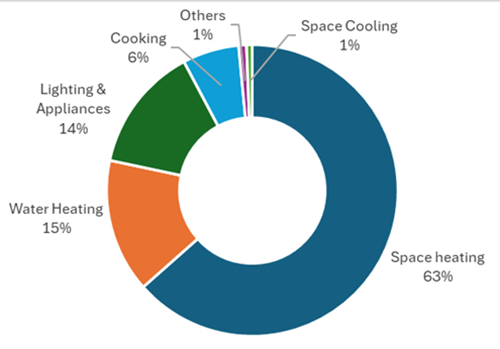
Source: Eurostat
As part of the ODYSSEE-MURE project, energy efficiency progress in the residential sector is measured by aggregating energy efficiency gains by end-use and quantifying them based on the reduction in unit consumption. Data collected as part of the ODYSSEE-MURE project (Figure 2), shows that in the residential sector, between 2000 and 2021, domestic water heating end-use registered the least energy efficiency progress in the EU when compared to other end-uses. In contrast, despite being the most energy demanding end-use, ODYSSEE-MURE data indicates that significant energy efficiency improvement was achieved in residential space heating between 2000 and 2021.
Figure 2: Residential energy efficiency progress in the EU by end-use (2000 = 100%), 2000 - 2021
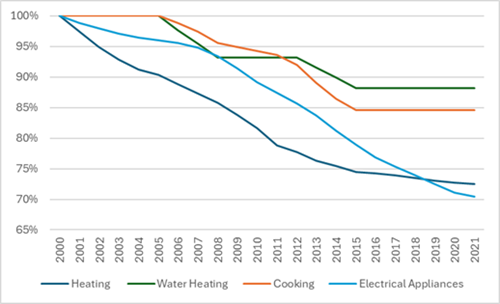
Source: ODYSSEE-MURE
Eurostat’s energy balance data (Figure 3) shows that in the EU, 16% of the energy demand for domestic water heating is sourced from renewable energy sources while 51% is sourced from fossil fuel energy sources (consisting of Fossil Fuels, Solid Fossil Fuels and Natural Gas). In contrast, 2022 data shows that in southern European countries (namely, Portugal, Spain, Malta, Croatia, Greece and Cyprus), 58% of the energy demand for domestic water heating is sourced from fossil fuel energy, while having a slightly larger share of renewable energy.
Figure 3: Share of energy consumed for domestic water heating in Europe by energy source (%), 2022
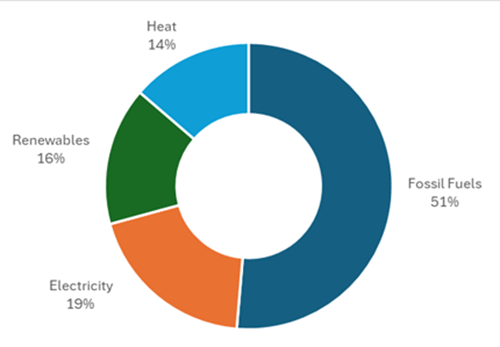
Source: Eurostat
Figure 4: Share of energy consumed for domestic water heating in southern European countries by energy source (%), 2022
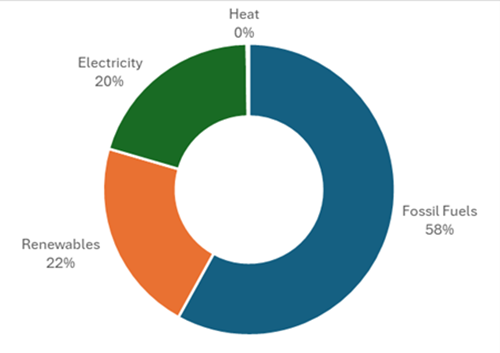
Source: Eurostat
In light of the technological advancements made over the years, it’s surprising that more significant energy efficiency improvements and a wider adoption of cleaner domestic water heating equipment like heat pump water heaters and solar water heaters have not been observed. Moreover, considering the ample solar irradiance in Southern European countries, a larger share of renewable energy consumption for domestic water heating would be expected.
It is evident that while some households have embraced greener options, others have been slower to adopt them or have only made partial changes. This policy brief provides an overview of domestic water heating technologies commonly found in southern European countries including, Portugal Spain, Malta, Croatia, Greece, and Cyprus. It will analyse policies and initiatives aimed at promoting the adoption of these technologies, as well as possible limitations that may impede their widespread use.
Domestic water heating technologies
Data shows that despite the availability of alternative water heating technologies such as solar water heaters and heat pump water heaters, conventional technologies such as electric water heaters and fossil-fuel run boilers are still prevalent in southern European households. Having said that, many reports indicate that the widespread adoption of solar water heaters and heat pump water heaters is often hindered by limited space availability, high initial expenses and weather dependency. Furthermore, other novel technologies are being made available in the market such as a combined system of photovoltaic (PV) panels and an electric water heater. This technology might also be a more sustainable and practical solution for southern European households.
To analyse alternative domestic water heating technologies available in countries with a similar climate as well as associated policies, a questionnaire was disseminated among energy policy professionals in southern European countries.
All southern European countries surveyed, indicated that electric water heater, fossil fuel run boiler and solar water heater technologies are all available in their countries. Portugal, Malta, Croatia, Greece and Cyprus have all indicated the availability of heat pump water heaters. Greece and Cyprus have also indicated the availability of combined systems that utilise photovoltaic panels and electric water heaters.
Survey results show that in the residential sector, respondents view solar water heaters and heat pump water heaters as the most suitable technology alternative to electric water heaters and fossil fuel run boilers. In all countries considered for this study, solar water heating was considered as an adequate alternative technology regarding solar water heating, citing the potential of solar thermal energy and climatic conditions. However, only respondents from Portugal and Greece considered heat pump water heating as an adequate alternative technology citing technological availability and lower overall costs (i.e. capital and operating costs combined) when compared to other convention domestic water heating technologies.
Policy approaches adopted to encourage alternative water heating technologies
Different policy approaches have been adopted in southern European countries to encourage the installation of alternative domestic water heating technologies. Some countries including Portugal, Spain, Greece and Cyprus have adopted a regulatory approach while others, such as Malta and Croatia have opted for a non-regulatory approach.
Through their building code legislation, Greece mandates the installation of both solar water heaters and heat pump water heaters. However, Greece only mandates the installation of such technologies in new buildings and buildings undergoing major renovations. Similarly, through their building code legislation, Spain only mandates the installation of solar water heaters.
Portugal mandates the installation of solar thermal technologies, or in its place, another renewable energy technology that produces the same amount of renewable energy as expected to be delivered by the solar thermal system. This mandate is applicable for both new buildings as well as buildings undergoing major renovations or specific renovations addressing the heating system.
Similarly, in Cyprus, the installation of solar water heaters was once mandatory, however the law was changed in 2017. In 2017, Cyprus’ new building code legislation introduced a renewable energy requirement for new buildings, based on the building’s primary energy consumption. Similar to other regulatory approaches, this new approach is still driving the installation of new solar water heating and heat pump water heating systems.
Despite adopting a regulatory approach, Portugal, Spain, Greece and Cyprus, have also put overarching policy measures (i.e. incentives) in place to encourage the voluntary installation of renewable or more energy efficient equipment, including heat pump water heaters and solar water heaters within existing, non-mandated buildings.
In contrast, Malta and Croatia have adopted a non-regulatory approach to encourage the adoption of alternative domestic water heating technologies. Instead of imposing regulations, these countries have offered incentives to encourage households to choose more sustainable options. However, one must note that the specific rules and requirements for incentive programs promoting alternative domestic water heating technologies differ between countries, depending on their national context and existing regulations.
While the findings highlight a diverse range of water heating technologies available and policies adopted in southern European countries, all countries contacted for the purposes of this brief have expressed a positive experience with the approach that was adopted in their country.
Counting of energy savings towards the energy savings obligation target
Article 8 of the EED recast obliges Member States to achieve cumulative energy savings either by establishing energy efficiency obligation schemes which can take the form of regulatory measures, or by adopting alternative policy measures such as the provision of incentives. For this reason, Member States may count energy savings arising from measures designed to promote the installation of solar and heat pump water heaters.
Among the southern European countries examined in this policy brief, Spain, Malta, Croatia, Greece and Cyprus, quantify energy savings resulting from policy initiatives promoting alternative domestic water heating technologies. The metrics used to measure energy savings from these technologies vary across countries. Following the guidelines and methods outlined in Annex V of the EED, most countries calculate projected energy savings from alternative domestic water heating technologies using an ex-ante approach based on monitored data from similar installations. However, other countries opt to quantify energy savings by comparing the new level of energy certification achieved with their pre-intervention energy certification level.
Conclusion
The results of this analysis show that alternative water heating technologies such as solar water heaters and heat pump water heaters are suitable alternatives in southern European countries. Moreover, all countries have indicated positive experiences with the approaches adopted to encourage the adoption of alternative domestic water heating technologies while most countries count the energy savings achieved towards the energy savings obligation target of the EED.
Despite advancements, more efforts are needed to decarbonize the domestic water heating sector. Southern European countries can leverage their favourable climatic conditions through regulatory or market-based incentives to promote the wider adoption of alternative technologies, especially solar water heaters.
